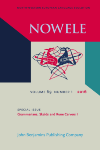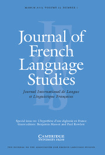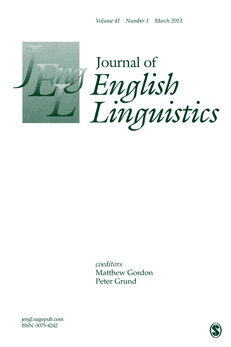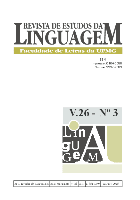
Slovo a Slovesnost
Scope & Guideline
Nurturing Excellence in Language Studies
Introduction
Aims and Scopes
- Sociolinguistic Investigations:
The journal emphasizes sociolinguistic studies, exploring how language varies and functions within different social contexts, including the impact of language on identity and cultural practices. - Corpus Linguistics Applications:
It frequently employs corpus-based methodologies to analyze linguistic structures and usage patterns, providing empirical evidence for theoretical claims in linguistics. - Language Ideology and Policy:
Research on language ideologies, language management, and policy is a core focus, highlighting the intersection of language with societal values, power dynamics, and political discourse. - Historical Linguistics and Dialectology:
The journal includes studies on historical linguistics and dialectology, examining language change over time and the influence of historical events on linguistic development. - Interdisciplinary Approaches to Language:
It promotes interdisciplinary research that integrates insights from various fields, including anthropology, history, and communication studies, to enrich the understanding of language phenomena.
Trending and Emerging
- Crisis Communication and Language:
The emergence of themes related to crisis communication, especially in the context of the pandemic, underscores the importance of language in managing public perception and response during crises. - Language and Technology:
There is a growing interest in how technology impacts language use, including studies on digital communication and the adaptation of language in online contexts, which reflects broader societal shifts towards digital interaction. - Multilingualism and Language Contact:
Research on multilingualism and the dynamics of language contact is increasingly prominent, reflecting the realities of global migration and the blending of languages in diverse communities. - Cultural and Ethnolinguistic Studies:
Emerging themes focus on the intersection of language with cultural identity and ethnolinguistic dynamics, highlighting the role of language in expressing and preserving cultural heritage. - Quantitative Linguistic Analysis:
There is a noticeable trend towards quantitative methods in linguistic analysis, particularly in onomastics and corpus linguistics, allowing for more rigorous and data-driven insights into language use.
Declining or Waning
- Traditional Dialect Studies:
Research focusing solely on traditional dialects has become less frequent, possibly due to a growing interest in urban language dynamics and the effects of globalization on linguistic diversity. - Prescriptive Language Norms:
There appears to be a decline in studies advocating for prescriptive language norms, as the journal shifts towards a more descriptive approach that emphasizes language usage in real-world contexts. - General Linguistic Theory:
Papers centered on broad theoretical frameworks of linguistics without specific contextual applications are becoming less common, indicating a trend towards more applied linguistic research. - Static Language Models:
Research employing static models of language analysis is waning, with a noticeable shift towards dynamic, interaction-focused studies that consider language as a living, evolving entity. - Historical Language Studies without Sociolinguistic Context:
Studies that examine historical language phenomena in isolation, without connecting them to sociolinguistic factors, are less prevalent, reflecting a growing understanding of the importance of context in historical linguistics.
Similar Journals

Language and Linguistics Compass
Connecting Scholars Across the Globe in Language ResearchLanguage and Linguistics Compass, published by Wiley, stands as a premier journal in the field of linguistics, showcasing innovative and interdisciplinary research. With its ISSN 1749-818X and E-ISSN matching, the journal has built a robust reputation, achieving an impressive Q1 ranking within the linguistics category for 2023, placing it in the top 4% of its field. Its Scopus rank of 48 out of 1167 highlights its influence and significance among linguistics journals, boasting a commendable 95th percentile. This journal serves as a vital resource for researchers, professionals, and students, offering a wide range of accessible articles that illuminate current trends and advances within the domain of language studies. Although it is not Open Access, the journal is committed to quality and diversity in its publications, ensuring scholarly articles from various sub-disciplines of linguistics are represented from 2008 through 2024. Located in the United Kingdom, Language and Linguistics Compass invites contributions from around the globe, reinforcing its status as a leading forum for linguistic discourse.

Langages
Connecting Global Voices Through Linguistic ResearchLangages is a premier peer-reviewed journal in the field of linguistics, published by Armand Colin, a reputable French publisher known for its commitment to advancing academic scholarship. With an ISSN of 0458-726X and an E-ISSN of 1958-9549, this journal has been an important platform for linguistic research since its inception in 1976, and it continues to engage with contemporary linguistic debates through to 2024. The journal is ranked in the top two quartiles for linguistics and language, reflecting its significance in the academic community, with a Q2 categorization in 2023, and robust Scopus rankings within the 66th to 69th percentiles across relevant categories. Authors and researchers from around the globe contribute to its rich tapestry of scholarly articles that explore the multifaceted nature of language and its role in society, making Langages an essential resource for linguists, educators, and students alike.

NOWELE-North-Western European Language Evolution
Illuminating the Paths of Language DevelopmentNOWELE-North-Western European Language Evolution, published by John Benjamins Publishing Co, serves as a vital platform for researchers and scholars interested in the evolution and dynamics of North-Western European languages. With an ISSN of 0108-8416 and an E-ISSN of 2212-9715, this journal has been contributing to the field of linguistics since its inception in 1983, with ongoing publications until 2024. Indexed in Scopus and classified in the Q3 category for Linguistics and Language, NOWELE is recognized for its rigorous academic standards and diverse contributions, ranking #485 out of 1088 in the Arts and Humanities category, and #566 out of 1167 in Social Sciences. The journal fosters an open dialogue within the linguistic community, presenting innovative research findings and theoretical advancements. Researchers, professionals, and students alike benefit from its systematic exploration of language evolution in the context of a rapidly changing global linguistic landscape.

Revista Argentina de Historiografia Linguistica
Exploring the evolution of language through time.Revista Argentina de Historiografia Linguistica, an esteemed academic journal based in Argentina, is dedicated to advancing the field of linguistic historiography. Published by the REVISTA ARGENTINA HISTORIOGRAFIA LINGUISTICA-RAHL, this journal serves as a vital platform for researchers, professionals, and students interested in the study of language history and the evolution of linguistic thought. With a commitment to open access, it promotes widespread dissemination of knowledge, ensuring that valuable insights reach a global audience. The journal aims to publish high-quality, peer-reviewed articles that explore various dimensions of linguistics, including historical language development, sociolinguistics, and language policy. By engaging with a diverse array of topics and methodologies, Revista Argentina de Historiografia Linguistica not only enhances academic discourse within the linguistics community but also fosters interdisciplinary collaboration, making it indispensable for those seeking to deepen their understanding of linguistic heritage and its contemporary significance.

Linguas e Instrumentos Linguisticos
Bridging Theory and Practice in Linguistic StudiesLinguas e Instrumentos Linguisticos is a premier academic journal dedicated to the exploration and analysis of language and linguistic tools, published by RG EDITORA in collaboration with Universidade Estadual de Campinas (UNICAMP). With a focus on enhancing the understanding of linguistic structures and applications, this journal serves as a vital resource for researchers, professionals, and students interested in the dynamics of language within various contexts. Although currently not open access, it offers a wide array of scholarly articles that delve into innovative methodologies, theoretical frameworks, and empirical studies in linguistics. Operating out of São Paulo, Brazil, Linguas e Instrumentos Linguisticos fosters a rich academic dialogue and is committed to advancing the field of linguistic research, making it an essential read for anyone engaged in linguistic studies.

Journal of French Language Studies
Pioneering Insights into the French Language LandscapeJournal of French Language Studies, published by Cambridge University Press, is a prestigious and leading journal in the field of linguistics and language that provides a platform for scholarly articles and research findings relevant to the French language and its various dimensions. With an impressive Q1 ranking in the 2023 categorization and ranked #257 out of 1088 in Scopus for Language and Linguistics, this journal plays a pivotal role in advancing the study of French linguistic methodologies, sociolinguistics, and applied linguistics. Since its inception in 1991, the journal has continually contributed to the academic community, attracting innovative investigations and theoretical discussions that enrich understanding and research in the field. Researchers and students enjoy comprehensive access to critical analysis and emerging trends, and as it continues to converge towards 2024, the journal promises to remain an essential resource for exploring the evolving landscape of French language studies.

Voprosy Yazykoznaniya
Illuminating the Landscape of Language StudiesVoprosy Yazykoznaniya, published by the esteemed Russian Academy of Sciences and the State Academy of Humanities (GAUGN), stands as a leading journal in the field of linguistics and language studies. With an impressive Q2 rank in Linguistics and Language for 2023 and a strong position within Scopus rankings, this journal fosters scholarly dialogue and pushes the boundaries of linguistic research by providing a platform for innovative studies, reviews, and analyses. Although not open access, its publication ensures high academic standards and visibility within the global academic community. Researchers, professionals, and students alike can benefit from the rich insights and diverse perspectives presented in this journal, serving as a vital resource for anyone interested in the intricacies of language and its role in society. Operating since 2009 and continuing to 2024, Voprosy Yazykoznaniya is an essential reference point for contemporary linguistic scholarship in the Russian Federation and beyond.

Studia z Filologii Polskiej i Slowianskiej
Illuminating the Nuances of Slavic LanguagesStudia z Filologii Polskiej i Slowianskiej is a prominent journal published by the Polish Academy of Sciences, Institute of Slavic Studies, focusing on the rich and diverse field of linguistics and language studies, particularly within the Slavic context. With the ISSN 0081-7090 and E-ISSN 2392-2435, this open-access journal has been a valuable resource for researchers, professionals, and students since its transition to an open-access model in 2014. It features rigorous peer-reviewed articles that contribute to the understanding of linguistic phenomena and cultural narratives across Slavic languages. Recognized within the Q3 quartile of linguistics and language in 2023, it ranks at the intersection of arts, humanities, and social sciences, providing insights that echo through disciplines such as sociolinguistics, psycholinguistics, and philology. In its ongoing publication trajectory from 2011 to 2023, Studia z Filologii Polskiej i Slowianskiej continues to foster academic discourse and collaboration, positioning itself as a key player in the global linguistic community.

JOURNAL OF ENGLISH LINGUISTICS
Unraveling the Complexities of English Language EvolutionJOURNAL OF ENGLISH LINGUISTICS, published by SAGE PUBLICATIONS INC in the United Kingdom, is a premier scholarly journal dedicated to advancing the field of linguistics through a rigorous exploration of the English language. With its ISSN 0075-4242 and E-ISSN 1552-5457, this quarterly journal boasts an impressive impact factor and maintains a notable standing within the academic community, evidenced by its Q1 ranking in Linguistics and Language. Its rich history, covering publications from 1967 to 2024, ensures that it remains an essential resource for researchers, professionals, and students alike, fostering critical discourse and innovative research in English linguistics. While the journal is not open access, it offers a wealth of valuable insights and cutting-edge findings that are vital for anyone interested in understanding the complexities of language structure, usage, and evolution. For those seeking to stay at the forefront of linguistic scholarship, JOURNAL OF ENGLISH LINGUISTICS represents an indispensable cornerstone in the field.

Revista de Estudos da Linguagem
Pioneering Insights in Linguistics and EducationRevista de Estudos da Linguagem, an esteemed academic journal published by the Universidade Federal de Minas Gerais within its Faculty of Letters, serves as a vital resource for scholars in the fields of linguistics and education. Since its inception in 1992, the journal has embraced an open access model, ensuring that research is accessible to a broader audience, thereby fostering collaboration and knowledge dissemination. Based in Brazil, this journal focuses on a wide array of topics related to language studies, contributing significantly to the discourse within the linguistics community. While recent rankings place it in Q4 in Education and Q3 in Linguistics and Language categories, its dedication to publishing high-quality research continues to attract attention despite its current Scopus rankings. The journal notably ranks at #668 in Language and Linguistics, verifying its emerging impact in the academic landscape. Researchers and students alike will find the journal's commitment to diversity in linguistic research a compelling reason to engage with its articles. The journal's offices are located at AV ANTONIO CARLOS, 6627 PAMPULHA, BELO HORIZONTE, MG, BRAZIL, and it continues to invite contributions that challenge established norms and explore innovative themes within the dynamic realm of language studies.